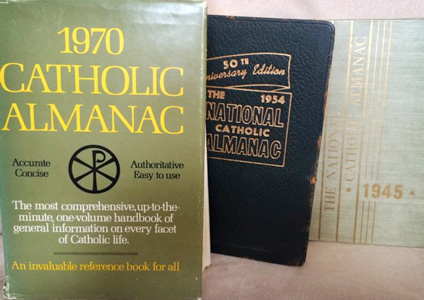
By Mark Pattison
Thinking in terms of the little engine that could, the annual Catholic Almanac, which sells about 5,000 copies each year, not only could, it can and does, each and every year since 1904.
A world of Catholic information gets packed into its 640 pages. And in the almanac’s 116 years, two men can claim to have been at the helm for more than half of its existence: Franciscan Father Felician Foy, who was its editor for 42 years, and Matthew Bunson, who succeeded Father Foy in 1997 and has been in charge ever since.
Father Foy supervised the production of the Catholic Almanac from his base in New Jersey. Thanks to technology, Bunson has been able to edit the work from Las Vegas and from Huntington, Indiana, which is headquarters to Our Sunday Visitor, which publishes the compendium.
“Each year is so interesting to work on. Each year is so very different,” said Bunson in a telephone interview with Catholic News Service (CNS).
Even so, “I don’t see how he managed to do it for 42 years,” Bunson said of his predecessor. “He came back from an ice-skating expedition with some fellow Franciscans and received a phone call and was told he would be taking over as editor of the almanac. So it wasn’t really a question.”
Father Foy’s editorship spanned the time from Pope Pius XII to St. John Paul II, with the Second Vatican Council in between and “the slow creep of technology.” Father Foy also had a staff of up to 50 to direct. Bunson’s staff is considerably smaller – “three or four, depending on the time of year,” he said – plus “a trusted staff of writers and consultants.”
The early almanacs were a Catholic version of Poor Richard’s Almanac or the Farmer’s Almanac in that they provided detail on the past year in general so that Catholics didn’t need to buy another almanac to get those facts. “There would be baseball scores, the Oscars” in early editions of the Catholic Almanac, Bunson said. But as Catholics made greater strides in secular society, that kind of material got dropped.
The almanac serves as “a snapshot of what’s going on in the life of the church at that time. In the 1950s, you don’t find too much stress on ecumenical outreach. But that really begins to change in the years of the (Second Vatican) Council and the postconciliar period,” he said.
With Bunson at the helm, “one of the first things we realized that we wanted to do was to make sure that each year’s edition reflected more of that year. So we expanded the annual coverage. Each section of the almanac, we’re talking about doctrine, we’re talking about canon law, ecumenism and interreligious dialogue, the church in the world, each had to be looked at from top to bottom,” he said.
“You include as much new, interesting material but important material as possible. It kind of becomes a juggling game,” and “it’s where technology becomes your friend,” as he’s able to edit, insert and delete material until the work has to be sent to the printer.
For the 2017 edition, to be published this fall, “we are trying, as we always do, to keep up with Pope Francis,” Bunson said. “With Francis, it’s in our new events section of the monthly news, including as much about his activities as possible.”
What does the future hold for the Catholic Almanac? “One of things we’ll be looking at in the coming years is the digital opportunities for the almanac, as with any other publication,” Bunson told CNS. “There’s a lot more we can do with the almanac, and it’s a really valuable resource, online as well as in published form. I’ve always been surprised over the years that we have many institution subscribers who see it as a go-to – you can’t find it on the Internet, the searches you’d have to do to find this information at your fingertips. There’s a shocking number of Catholics who read it to find out what’s going on in the church.”
Bunson also will get to edit the almanac from a third city: somewhere in the Washington area. He’s getting married in the fall – just around the time the almanac is published – and his fiancee works for the Diocese of Arlington, Va. “I’m actually looking forward to what can be done from the Washington side, culturally, and what is going on the church in the Washington, D.C., area.”
Mark Pattison writes about entertainment for Catholic News Service.
